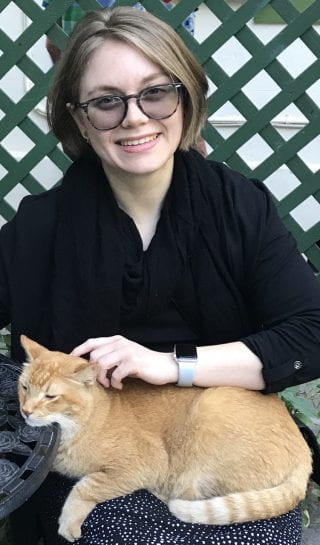by Kathleen Esling
My twelfth grade students get some hints early on — like, on the first day of class — that English IV: World Literature will spend a great deal of time talking about adaptation. Putting original works in conversation with new tellings is one of my favorite things to do as a librarian, and it was only natural that I would bring that love of adapted stories with me into my classroom. In English last year, we read Antigone and followed it up with Home Fire by Kamila Shamsie. This year, following our Home Fire reading, students chose to read either Circe or Song of Achilles, and in the second semester, we will read Twelfth Night and watch a film adaptation of the classic comedy. In addition to essays analyzing the texts we read this year, I will also be taking full advantage of how sneakily powerful a creative response can be in terms of eliciting textual analysis from a student. My favorite assignment I ask students to create is one I learned about at the University of Arkansas during Remaking Monsters and Heroines in June 2018: individual podcast adaptations.
During Remaking Monsters and Heroines, I had a blast learning how to create a podcast. When we were asked to create a final project to display what we had learned, I immediately turned to podcasting; the opportunity to unpack a text from the inside is one I relish. With the podcast project I completed in 2018, I was able to dive directly into the worlds of “Rapunzel” and Welcome to Night Vale, a combination that let me explore two of my favorite texts and make them my own. In November 2018, I asked my students to adapt a scene from Antigone into a podcast. The field was wide open for them: they could base their work on any podcast, adapt any scene, and set it in any time period. My only rules were that it needed to be at least three minutes’ worth of audio with two drafts of a script. We spent several class periods conferencing, drafting, editing, and recording. When I got to listen to the final projects, they were astounding. The students created amazing new works bringing Sophocles’s ancient story to new life. Many of the 2018 podcasts sounded like Serial, the podcast example that most resonated with the class during our introduction to podcasting unit. This year, my students felt a strong connection with conversational podcasts, and the relaxed “interviews” I received from the worlds of Antigone, The Iliad, and The Odyssey breathed new life into both the stories as well as my students’ understanding of those stories. As one student wrote in her end-of-unit reflection, “This project was super fun to create and helped me jump out of my comfort zone.” I was asking them to reveal some vulnerability; we were creating fairly open-ended works, not five paragraph essays with a rigid structure. Each student, however, dove into the challenge and created something that showcased their understanding of their anchor text.
When it came time to read their final essays at the end of the semester, I was also excited to see how their experience podcasting changed each student’s analysis of the book they chose. As I read their finals, I could see the shifts in their understanding. The clarity my students used to describe the authors’ intentions and craft jumped off of the page. While our in-class discussions were certainly part of their reading journey, the opportunity they had to really dive into the worlds of ancient Thebes, Ithaca, or Troy (or modern day London, in the case of Home Fire) gave them new insights into the works they were analyzing.
I’m incredibly grateful to the University of Arkansas and the National Endowment for the Humanities for offering Remaking Monsters and Heroines in 2018. The institute made my teaching much richer, and I’m thankful to have the opportunity now to share what I learned with my students. Listening to their podcasts is a highlight of my year, and I can’t wait to see what my students adapt next.
 Kathleen Esling is the middle and upper form librarian as well as a member of the English Department faculty at Convent & Stuart Hall in San Francisco. In the library, she guides students as they learn how to perform research thoughtfully. Outside the library, Kathleen teaches English IV: World Literature to seniors, a class that explores contemporary global perspectives in fiction, poetry, and drama. Kathleen’s background as an English major and theatre minor drives her interest in storytelling and story sharing.
Kathleen Esling is the middle and upper form librarian as well as a member of the English Department faculty at Convent & Stuart Hall in San Francisco. In the library, she guides students as they learn how to perform research thoughtfully. Outside the library, Kathleen teaches English IV: World Literature to seniors, a class that explores contemporary global perspectives in fiction, poetry, and drama. Kathleen’s background as an English major and theatre minor drives her interest in storytelling and story sharing.